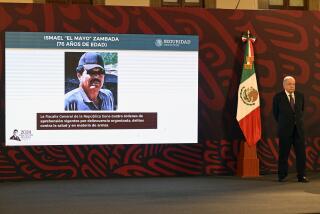INS Slaps a ‘Hold’ on Release of Zuno Arce
After being held 26 days without bail, a Mexican businessman described by government officials as a “material witness” in the investigation of the February, 1985, murder of U.S. drug enforcement agent Enrique Camarena was ordered released Tuesday by a federal district judge.
However, later in the day, U.S. District Judge Edward Rafeedie said that he could not release Ruben Zuno Arce on bail until Immigration and Naturalization Service officials in San Antonio hold a hearing on whether Zuno Arce can be excluded from the United States in the future as “a narcotics trafficker.”
Attorney Edward M. Medvene, clearly angry at the turn of events, said the decision to keep Zuno Arce, 59, in custody for at least one more day “is outrageous because there is no evidence that he is a drug trafficker.” Donald Looney, deputy director of the INS, said Zuno Arce ,59, will be flown from Los Angeles to San Antonio today. Looney said he expected the immigration hearing to be held within a day.
Zuno Arce, who has proclaimed since he was first detained on Aug. 9 that he had no involvement in the Camarena murder and has continually denied that he is a drug trafficker, had tears in his eyes as he hugged his three attorneys after Rafeedie ordered him released at a 1:30 p.m. hearing. Soon thereafter, however, Zuno Arce’s lawyers were told that he would not be released because of a pre-existing “INS hold” on him in San Antonio.
When Zuno Arce was arrested in San Antonio, Gary Renick, INS deputy chief there, said he was on a special list of people believed to be drug traffickers. Zuno Arce was being held there when a warrant was issued, asking that he be brought to Los Angeles for questioning in connection with the Camarena case.
No government official has provided any information publicly explaining the basis for the assertion that Zuno Arce is a drug trafficker.
Federal prosecutors here have submitted information about Zuno Arce to Rafeedie that has not been made public.
Zuno Arce’s lawyers Medvene and James E. Blancarte have been arguing for several weeks that it was illegal for the government to continue to hold Zuno Arce without filing any charges against him and that the government was overreaching. Late Tuesday afternoon, the situation became particularly heated when Medvene accused Assistant U.S. Atty. Jimmy Gurule of phoning the INS in San Antonio and seeking its assistance in facilitating the continued incarceration of Zuno Arce. Gurule strenuously denied the charge that he had done anything improper.
At the first hearing Tuesday, Gurule told Rafeedie that he wanted him to continue to hold Zuno Arce without bail as a “material witness” in the October trial of Juan Jose Bernabe Ramirez, a former Mexican policeman who was indicted on Aug. 9 on murder and conspiracy charges stemming from the Camarena slaying. Rafeedie rejected the request.
Zuno Arce once owned the Guadalajara house where Camarena was tortured. The government asserted that he might have knowledge of events that occurred there after he sold the house and it was subsequently bought by Rafael Caro Quintero, a Mexican drug kingpin now in jail in Mexico City on charges of murdering Camarena.
Last month, Rafeedie ruled twice that the government could continue to hold Zuno Arce without bail, while he was being questioned by a federal grand jury looking into the Camarena killing. Prosecutors asserted he was a “flight risk” because he is wealthy, can fly a plane, has no significant ties to Los Angeles and is politically well-connected in Mexico, a reference to the fact that he is the brother-in-law of former Mexican President Luis Echeverria.
He was questioned by federal prosecutors in front of the grand jury on Aug. 24 and 31. A transcript of the proceedings was provided to Rafeedie.
“He has answered every question,” Medvene said in arguing for Zuno Arce’s release on Tuesday. Medvene said that Zuno Arce denied:
--Involvement in narcotics trafficking, being an intermediary in dealings between narcotics traffickers and government officials (in Mexico) or being in the Lope de Vega residence after Dec. 23, 1984.
--Ever knowing or meeting Bernabe Ramirez.
--Ever knowing anyone or meeting any other person identified to him as either a defendant or a suspect in the Camarena case including Rafael Caro Quintero, Ernesto Fonseca Carrillo, Armando Pavon Reyes (a former Mexican police official who allegedly took a bribe to let Caro Quintero flee Guadalajara in 1985) and approximately 120 others depicted in photographs shown to him during the grand jury proceedings.
--Knowing anything about the abduction, torture and murder of Camarena or his pilot, Alfredo Zavala Aquilar, other than that which is public information.
Rafeedie said that having reviewed the grand jury transcript he found that there was no legal basis to justify further incarceration of Zuno Arce. “I believe the purpose of detention has been satisfied. . . . This witness has little to offer to the Bernabe Ramirez case.”
But later in the day, Rafeedie said he had no jurisdiction to order Zuno Arce be released on bail because of the pending hearing in San Antonio.
It appeared likely that Zuno Arce would be back in Mexico soon, however, regardless of the outcome of the hearing in San Antonio. Lawyers said Tuesday that he either would return to his native country as a person who is free to return to the United States on a visa or returned to Mexico as an “excludable alien” because of findings made by an immigration judge in San Antonio.
More to Read
Sign up for Essential California
The most important California stories and recommendations in your inbox every morning.
You may occasionally receive promotional content from the Los Angeles Times.










